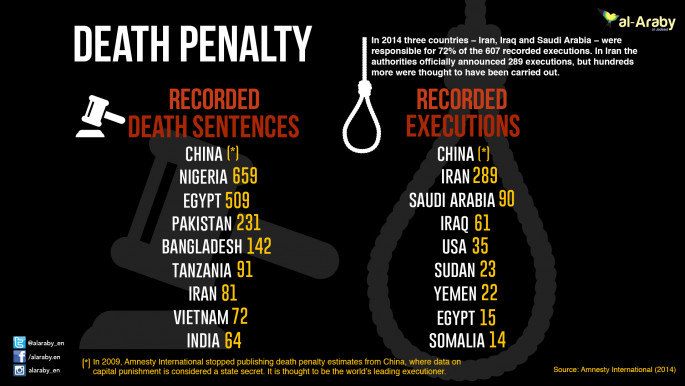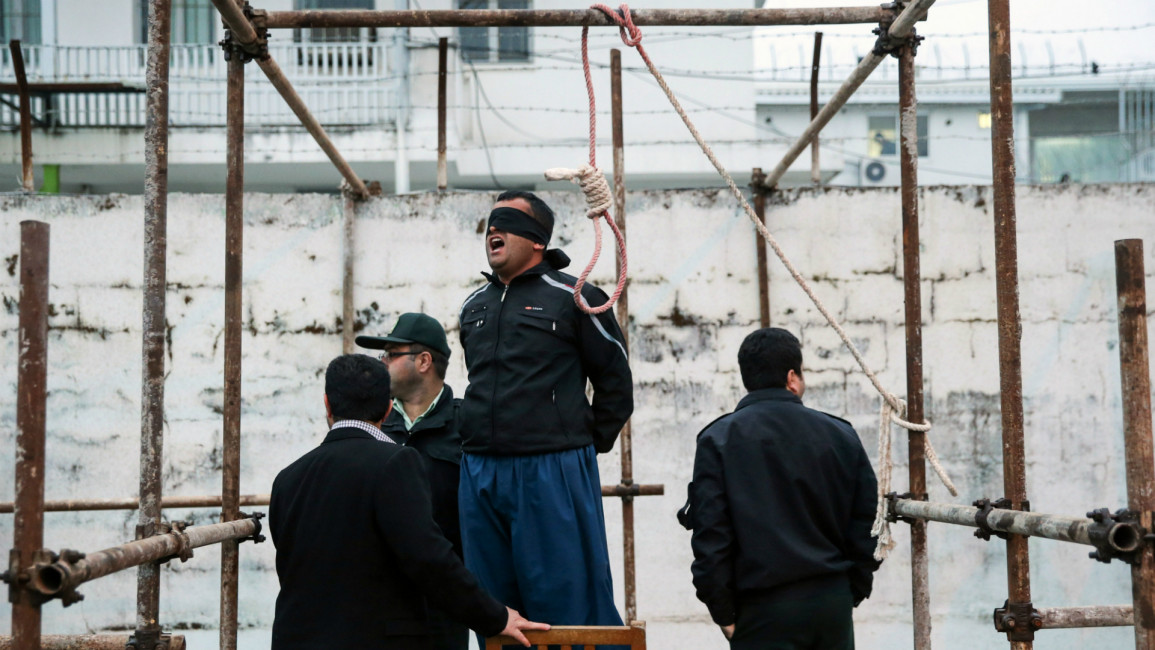Iran: World's highest known rate of judicial executions
Iran: World's highest known rate of judicial executions
Executions in Iran could top 1,000 this year as the country executes more individuals per capita than any other country in the world, according to a UN investigator.
4 min read
Iran has reportedly executed at least 694 people so far in 2015 [AFP]
Executions in Iran have been rising at "an exponential rate" since 2005 and could top 1,000 this year as the country cracks down on drug offenders, a UN investigator said on Tuesday.
Ahmed Shaheed told the General Assembly that Iran executes more individuals per capita than any other country in the world.
He said the majority of executions violated international laws that ban the use of capital punishment for non-violent offences and for juveniles.
He urged Iran to impose a moratorium on the death penalty in those cases, and for all but the "most serious crimes" - where it can be shown there was an intention to kill that resulted in the loss of life.
Shaheed, the special investigator on the human rights situation in Iran, said the "shocking 753 executions" carried out by Iran in 2014 - the highest number ever - will be topped this year.
In the first seven months of 2015, at least 694 people were reportedly executed by hanging, he said, and a number of human rights organisations now report that well over 800 individuals have been executed in the past 10 months.
"And there are dozens more waiting a similar fate on death row," he added.
Shaheed called the rate of executions "alarming" and said Iran was "possibly on track to exceed 1,000 by the end of the year".
He said 69 percent of the executions during the first six months of 2015 were reportedly for drug-related offences, reflecting the increasing influx of drugs and rising drug abuse in the country.
The government view, Shaheed said, is that the effects of drug trafficking on the health and security of the Iranian people mean that drug-related offences must fall into the "most serious" category, which deserve to be considered capital offenses.
Tehran denied that a majority of the executions documented by human rights organisations had taken place and requested proof from investigators, he conceded.
While Shaheed said the overall human rights situation in Iran remained "dire," his latest report was "marginally more optimistic than my previous reports".
For the first time, he met with Iranian judicial, human rights, foreign affairs and narcotic officials in Geneva on September 15 and 16 to discuss the gravity of the drug problem and the government's response. He called the government's engagement with him "more substantive", but stressed that none of the UN special investigators on rights issues have visited Iran since 2005.
He said the nuclear deal between Iran and six world powers reached in July and the lifting of economic sanctions that is expected to follow "can potentially have a beneficial multiplier effect on the human rights situation in the country, especially on the enjoyment of economic and social rights".
Shaheed urged continuing support for President Hassan Rouhani's government to strengthen protections for fundamental rights and improve laws - but he said reforms require support from all branches of the government and state.
"Therefore, it is my sincere hope that Iranian officials will come together with the same constructive spirit that resulted in the nuclear agreement to address the serious rights abuses taking place in the country today," he said.
Shaheed cited Iran's reported use of prolonged solitary confinement, and torture to obtain confessions.
In 2014, at least 607 executions were reported to have been carried out worldwide, a decrease of almost 22 percent compared with the figures recorded for 2013, according to Amnesty International.
This figure does not include the number of people who were believed to have been executed in China. In 2009, Amnesty International stopped publishing the organisation's estimated figures on the use of the death penalty in China, where data on capital punishment is considered a state secret. China is believed to be the world's number one executioner.
Three countries - Iran, Iraq and Saudi Arabia - were responsible for 72 percent of the 607 recorded executions in 2014. In Iran, the authorities officially announced 289 executions, but hundreds are thought to have been carried out which were not officially acknowledged. Saudi Arabia reportedly executed at least 90 and Iraq killed 61.
The US executed 35 people in 2014, followed by Sudan (23), Yemen (22) and Egypt (15).
At least 2,466 people in 55 countries are known to have been sentenced to death in 2014 and 19,094 people were believed to be living under a death sentence around world at the end of last year.
With China excluded, Nigeria topped the 2014 list with 659 death sentences, followed by Egypt (509), Pakistan (231) and Bangladesh (142). Iran came sixth with 81, followed by the US (72).
Ahmed Shaheed told the General Assembly that Iran executes more individuals per capita than any other country in the world.
He said the majority of executions violated international laws that ban the use of capital punishment for non-violent offences and for juveniles.
He urged Iran to impose a moratorium on the death penalty in those cases, and for all but the "most serious crimes" - where it can be shown there was an intention to kill that resulted in the loss of life.
Shaheed, the special investigator on the human rights situation in Iran, said the "shocking 753 executions" carried out by Iran in 2014 - the highest number ever - will be topped this year.
| In the first seven months of 2015, at least 694 people were reportedly executed by hanging - UN investigator Ahmed Shaheed |
In the first seven months of 2015, at least 694 people were reportedly executed by hanging, he said, and a number of human rights organisations now report that well over 800 individuals have been executed in the past 10 months.
"And there are dozens more waiting a similar fate on death row," he added.
Shaheed called the rate of executions "alarming" and said Iran was "possibly on track to exceed 1,000 by the end of the year".
He said 69 percent of the executions during the first six months of 2015 were reportedly for drug-related offences, reflecting the increasing influx of drugs and rising drug abuse in the country.
The government view, Shaheed said, is that the effects of drug trafficking on the health and security of the Iranian people mean that drug-related offences must fall into the "most serious" category, which deserve to be considered capital offenses.
Tehran denied that a majority of the executions documented by human rights organisations had taken place and requested proof from investigators, he conceded.
While Shaheed said the overall human rights situation in Iran remained "dire," his latest report was "marginally more optimistic than my previous reports".
For the first time, he met with Iranian judicial, human rights, foreign affairs and narcotic officials in Geneva on September 15 and 16 to discuss the gravity of the drug problem and the government's response. He called the government's engagement with him "more substantive", but stressed that none of the UN special investigators on rights issues have visited Iran since 2005.
He said the nuclear deal between Iran and six world powers reached in July and the lifting of economic sanctions that is expected to follow "can potentially have a beneficial multiplier effect on the human rights situation in the country, especially on the enjoyment of economic and social rights".
Shaheed urged continuing support for President Hassan Rouhani's government to strengthen protections for fundamental rights and improve laws - but he said reforms require support from all branches of the government and state.
| Iran, Iraq and Saudi Arabia - were responsible for 72% of the 607 recorded executions in 2014 - Amnesty International |
"Therefore, it is my sincere hope that Iranian officials will come together with the same constructive spirit that resulted in the nuclear agreement to address the serious rights abuses taking place in the country today," he said.
Shaheed cited Iran's reported use of prolonged solitary confinement, and torture to obtain confessions.
In 2014, at least 607 executions were reported to have been carried out worldwide, a decrease of almost 22 percent compared with the figures recorded for 2013, according to Amnesty International.
This figure does not include the number of people who were believed to have been executed in China. In 2009, Amnesty International stopped publishing the organisation's estimated figures on the use of the death penalty in China, where data on capital punishment is considered a state secret. China is believed to be the world's number one executioner.
 |
Three countries - Iran, Iraq and Saudi Arabia - were responsible for 72 percent of the 607 recorded executions in 2014. In Iran, the authorities officially announced 289 executions, but hundreds are thought to have been carried out which were not officially acknowledged. Saudi Arabia reportedly executed at least 90 and Iraq killed 61.
The US executed 35 people in 2014, followed by Sudan (23), Yemen (22) and Egypt (15).
At least 2,466 people in 55 countries are known to have been sentenced to death in 2014 and 19,094 people were believed to be living under a death sentence around world at the end of last year.
With China excluded, Nigeria topped the 2014 list with 659 death sentences, followed by Egypt (509), Pakistan (231) and Bangladesh (142). Iran came sixth with 81, followed by the US (72).


![President Pezeshkian has denounced Israel's attacks on Lebanon [Getty]](/sites/default/files/styles/image_684x385/public/2173482924.jpeg?h=a5f2f23a&itok=q3evVtko)



 Follow the Middle East's top stories in English at The New Arab on Google News
Follow the Middle East's top stories in English at The New Arab on Google News


